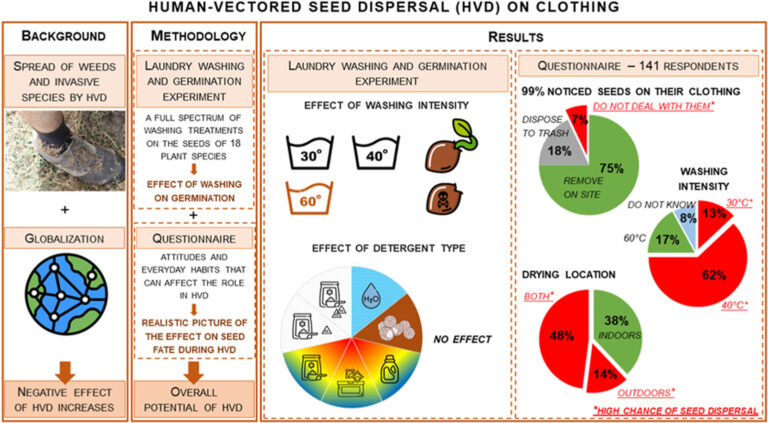- Szerzők: Lukács Katalin, Kiss Réka, Tóth Ágnes, Godó Laura, Deák Balázs, Valkó Orsolya
- Megjelenés: 2024, Journal of Environmental Management
- URL: https://www.sciencedirect.com/science/article/pii/S0301479725003214?via%3Dihub
- MTMT azonosító: 35733285
Absztrakt: Unintentional human-vectored seed dispersal (HVD) occurs when the seed dispersal vectors are humans, and the seeds are attached to clothing or footwear during various outdoor activities. Since most plant species spread by HVD are invasives or weeds, the process can have globally relevant adverse environmental effects due to the growing global tourism industry. Here we evaluated whether the germination capacity of seeds can be reduced by laundry washing treatments used in households, in order to decrease the chance of unintended dispersal of plant species by clothing. We experimentally tested the effects of seven types of detergents with different chemical composition and three washing intensities in a full factorial design on the germination capacity of 18 plant species. Washing at high intensity (60 °C) significantly decreased the germination capacity in 15 species, probably due to high temperatures and longer exposure times. Washing at low (30 °C) and medium intensities (40 °C) had no effect. Detergent type affected the germination capacity of only three species. The findings underscore the importance of laundry washing in seed dispersal, since the low and medium washing intensities and detergent types that are commonly used in households do not decrease the germination capacity of the cloth-dispersed seeds. We urge addressing the spread of HVD-dispersed seeds through combined biosecurity measures. Self-regulation, such as removing of seeds from clothes and disposing them properly, is crucial. Informing outdoor workers, who play the largest role in HVD, can encourage small behavioural changes to decrease the adverse effects of this process.



